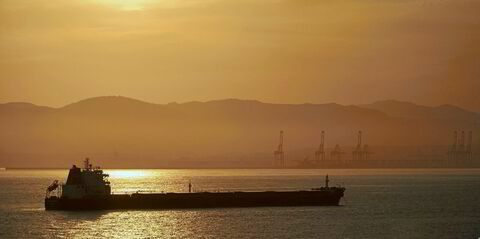All the world’s biggest container shipping lines have now said they will avoid the Red Sea and Suez Canal due to the risk of terrorist attacks.
Following similar announcements by AP Moller-Maersk and Hapag-Lloyd the day before, MSC Mediterranean Shipping Company and CMA CGM said on Saturday they have paused such voyages or started diverting services south around the Cape of Good Hope.
This follows the decision of Maersk and Hapag-Lloyd a day earlier to suspend sailing through the vital waterway in the face of increasing missile and rocket attacks from Houthi rebels in Yemen.
All eyes will now be on other shipping players and container lines, which will all face intense pressure to suspend transits causing potential global supply chain delays.
CMA CGM said that the increased safety measures it has taken since Yemen’s Houthi rebels started attacking shipping off the country’s coasts last month, are no longer enough.
“We have decided to instruct all CMA CGM container ships in the area that are scheduled to pass through the Red Sea to reach safe areas and pause their journey in safe waters with immediate effect until further notice,” the French company said.
“CMA CGM is taking all necessary steps to preserve its transportation services for its customers,” it added, without elaborating how.
Earlier on Saturday, MSC announced a similar decision came after its 2,546-teu vessel MSC Palatium III (built 2006) was attacked on Friday morning while in the Red Sea.
The vessel’s master reported an explosion on board that resulted in a fire that was extinguished.
“All crew are safe with no reported injuries, meanwhile the vessel suffered limited fire damage and has been taken out of service,” MSC said. The vessel was under sub-charter to Messina Line.
“Due to this incident and to protect the lives and safety of our seafarers, until the Red Sea passage is safe, MSC ships will not transit the Suez Canal eastbound and westbound. Already now, some services will be rerouted to go via the Cape of Good Hope instead.”
MSC said sailing schedules will be delayed “by several days”.
Separately on Friday, the 12,199-teu MSC Alanya (built 2021) was asked to change course by “Yemeni authorities”, as the Houthis consider themselves.
Refused to change course
The Houthis assumed responsibility for both Friday’s attacks on MSC vessels, which took place after similar attacks on ships by Hapag-Lloyd and Maersk, which suspended Red Sea traffic on Friday.
According to Houthi spokesman Yahya Saree, they “were targeted after their crews rejected to respond to calls from Yemeni naval forces, as well as scorching warning signals”.
“Yemeni armed forces reassure all ships heading to all ports across the world, except for these heading to Israeli ports, that they would be safe and must keep the identifying device open.”
The Iranian-backed Houthis are acting in support of Hamas, which is fighting Israel in Gaza, after a brutal Hamas attack on Israel in early October.
Big liners began diverting vessels even before announcing their suspension of Red Sea traffic on Friday.
MSC’s 8,533-teu MSC Tokyo (built 2006) departed King Abdullah port in Saudia Arabia on Friday and was sailing southbound in the Red Sea with the United Arab Emirates as its predicted destination before carrying out a U-turn.
The Swiss liner giant’s 6,750-teu MSC Luisa (built 2002) was showing a similar course change, according to VesselsValue data.
On Friday, the International Chamber of Shipping and the World Shipping Council urged governments to send more warships to the afflicted area.
They also expressed unease at the decision by some shipping companies to reroute vessels around the Cape of Good Hope, in moves the ICS said are “adding cost and delay to global trade”.
Naval action
Another Houthi attack likely happened on Saturday.
UK navy vessel Diamond shot down a suspected attack drone targeting merchant shipping in the Red Sea, UK defence minister Grant Shapps said on Saturday.
“One Sea Viper missile was fired and successfully destroyed the target,” Shapps wrote on X without elaborating further.
The Houthis also escalated operations by launching drone attacks directly against Israel.
“The air force of the Yemeni Armed Forces carried out a military operation against vital targets in the Umm al-Rashrash area in southern occupied Palestine with a large batch of drones,” Saree said on X.
The US military confirmed Houthi statements. According to Centcom, the warship USS Carney “successfully engaged 14 unmanned aerial systems launched as a drone wave from Houthi-controlled areas of Yemen”.
The unmanned aerial vehicles “were shot down with no damage to ships in the area or reported injuries,” Centcom added.




